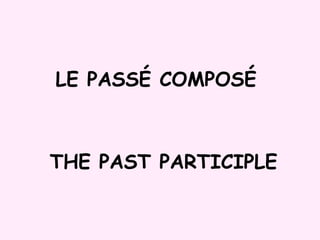
FRENCH PASSE COMPOSE WITH AVOIR AND ETREr
- 1. LE PASSÉ COMPOSÉ THE PAST PARTICIPLE
- 5. The two auxiliaries used are: être avoir To have To be
- 6. They are employed in present tense as follow: Avoir J’ai = I have Tu as = you have(sin.) Il a = he has Ell a = she has Nous avons = we have Vous avez = you have (pl.) Ils ont = they have Ê tre Je suis = I am Tu es = you are (sing.) Il est = he is Elle est = she is Nous sommes = we are Vous êtes = you are (sing.) Elles sont = they are
- 7. Il a Nous avons J’ ai Elles ont Vous avez Tu as Ils ont Maintenant à votre tour What comes after each subject pronoun? The verb Avoir
- 8. Il est Nous sommes Je suis Elles sont Vous êtes Tu es Ils sont Maintenant à votre tour What comes after each subject pronoun? The verb Être
- 9. saut er é finir fini For the verbs in –re , take off –re and replace with -u répond re u Le chat a J’ ai Tu as For regular verbs with an infinitive ending in er , the past participle is formed by replacing the final -er of the infinitive with -é . The past participle of regular verbs with an infinitive ending in –ir is formed by dropping the final -r from the infinitive Formation of pass é compos é with the verb Avoir
- 11. Use the rules to find the past participle of the following verbs: é manger choisir perdre vendre écouter sauter u i é u é i é u
- 13. Excellent !!!!!! http://www.laits.utexas.edu/tex/gr/tap2.html http://www.quia.com/cb/25938.htmlhttp://fran-lang.vaniercollege.qc.ca/prep/temps/pc1.htm (2students) http://www.quia.com/rr/103903.html (points) http://uregina.ca/LRC/HotPot/French/Elementaire/exercises/V/v052.htm (exercise) http://www.bonjourdefrance.com/n7/qcm/fpedq.htm (exercise)
- 14. Un peu plus de pratique parler chanter marcher parlé chanté marché blondir blondi rendre rendu subir subi vendre vendu écouter écouté noircir noirci
- 15. Bon, c’est fini ... Fantastic !!!
- 27. When the passé composé is formed with Être, the past participle behaves like an adjective. So , if you have a feminine subject (the “doer” of the verb), you must also have a feminine past participle. Eg Elle est allé (feminine) e If the subject is plural , the past participle must also be plural . Eg Ils sont allé (masculine plural) s Il est allé (masculine) BUT Elles sont allé (feminine plural) e s
- 28. Here is a table showing all the agreements je suis allé (e) tu es allé (e) il est allé elle est allé e nous sommes allé (es)(s) vous êtes allé (e)(es)(s) ils sont allé s elles sont allé es
- 29. Here are the past participles of some of the “Être” verbs Infinitive Past Participle English R entrer R entré (e)(s) went back E ntrer E ntré (e)(s) entered V enir V enu (e)(s) came R ester R esté (e)(s) stayed S ortir S orti (e)(s) went out P artir P arti (e)(s) left R etourner R etourné (e)(s) returned A ller A llé (e)(s) went T omber T ombé (e)(s) fell
- 30. Can you remember what to do? Il est … allé s allé allé e allé allé e s Choose the correct past participle.
- 31. Ils sont… allé s allé e s allé e allé s allé
- 32. Elles sont… allé s allé e s allé e allé e s allé
- 33. Je m’appelle Julie. Je suis… allé s allé e s allé e allé e allé
- 34. Nous (m.pl) sommes… allé s allé e s allé e allé s allé
- 35. Patrick et Marianna sont… allé s allé e s allé e allé s allé
- 36. Tu (f) es … allé s allé e s allé e allé e allé
- 37. M. Sam, vous êtes… allé s allé e s allé e allé allé
- 38. Salut, je suis Marie. Samedi ma mère et moi sommes… allé s allé e s allé e allé e s allé
- 39. Ils sont… allés allé es allé e allés allé
- 40. Nicole et Sarah, vous êtes… allé s allé es allé s allées allé
- 41. David et sa sœur sont… allé s allées allé e allés allé
- 42. Bonjour, je m’appelle Thomas. Ma copine est … allés allées allée allé e allé
- 43. Maman, Michael et Ted sont… allé s allé es allé e allés allé
- 45. Félicitations!
